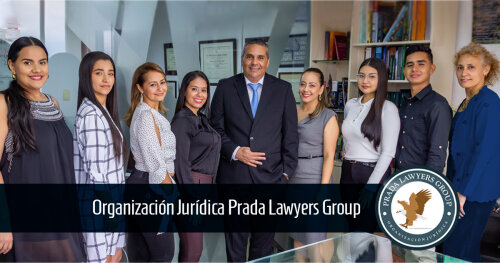Best Child Visitation Lawyers in Bucaramanga
Share your needs with us, get contacted by law firms.
Free. Takes 2 min.
Free Guide to Hiring a Family Lawyer
List of the best lawyers in Bucaramanga, Colombia
About Child Visitation Law in Bucaramanga, Colombia
Child visitation law, or régimen de visitas, in Bucaramanga, Colombia, regulates the right of separated or divorced parents - as well as other relatives in some cases - to maintain regular contact and relationship with their children when those children do not live with them. These laws are designed to protect the best interests of the child, ensuring they have access to both parents and extended family when possible. Visitation arrangements are typically set by mutual agreement or, when disagreement arises, determined by a family court judge considering the child's well-being above all else.
Why You May Need a Lawyer
Legal assistance can be crucial in several common situations involving child visitation in Bucaramanga:
- Parents cannot agree on visitation schedules following a separation or divorce.
- One parent is being denied visitation rights without a valid legal reason.
- Concerns about the safety or well-being of the child during visitation.
- Seeking to modify existing visitation orders due to changes in circumstances.
- Involvement of grandparents or other relatives wishing to maintain a relationship with the child.
- Suspicions or allegations of abuse or neglect affecting visitation rights.
- Enforcement of visitation rights when the other parent does not comply with court orders.
A lawyer specializing in family law can help mediate agreements, represent you in court, ensure your rights are protected, and prioritize the child's needs.
Local Laws Overview
Child visitation in Bucaramanga is governed under Colombian national family law, specifically in accordance with the Código de Infancia y Adolescencia and the Código Civil. Key aspects include:
- The best interest of the child is the overriding principle in any court decision or mediated agreement related to visitation.
- The law encourages parents to reach a voluntary agreement on visitation arrangements. If agreement is not possible, a judge will decide.
- Both parents have equal rights to maintain contact with their children unless there are compelling reasons (such as abuse or neglect) to restrict visitation.
- A judge may order supervised visitation in cases where there are concerns about the child’s safety.
- Grandparents, siblings, and other relatives may request visitation rights under special circumstances.
- It is prohibited to use visitation as leverage in disputes related to alimony or child support.
- If visitation schedules are repeatedly violated, the affected party may request enforcement through the courts.
Frequently Asked Questions
What is child visitation?
Child visitation refers to the legal right of a parent or relative to spend time with a child who does not live with them, as established by agreement or court order.
Who can request visitation rights in Bucaramanga?
Typically, non-custodial parents have the right to visitation, but in special cases, grandparents, siblings, or other close relatives can also request visitation rights.
How is the visitation schedule decided?
The schedule is ideally decided by mutual agreement between the parents. If they cannot agree, a family court judge will determine the arrangement based on the child's best interests.
Can visitation be denied or restricted?
Yes, visitation can be restricted or supervised if there are proven concerns about the child’s safety or well-being, such as risk of abuse, neglect, or abduction.
What happens if the other parent does not respect the visitation agreement?
If one parent consistently violates the agreed or court-ordered visitation schedule, the other parent can seek enforcement or modification through the family courts.
Is it possible to modify an existing visitation agreement?
Yes, either parent or a concerned party can request a change to existing arrangements if there has been a significant change in circumstances affecting the child or either parent.
Do fathers have the same visitation rights as mothers?
Both parents have an equal right to visitation under Colombian law, regardless of gender, unless a court finds a compelling reason to limit one parent’s access.
Can the child refuse to participate in visitation?
Older children’s views may be taken into account by the court, but generally, visitation is considered a right of the child as well as the parent, and should not be arbitrarily refused.
How do I start the legal process for visitation?
You can begin by consulting a family law professional who can guide you on mediation or, if necessary, help you initiate proceedings at the local family court.
Are visitation agreements enforceable by law?
Yes, once validated by the court or reached through formal mediation and registered, visitation agreements are legally binding and enforceable.
Additional Resources
For further information, support, or legal assistance regarding child visitation in Bucaramanga, consider contacting:
- Family Commissaries (Comisarías de Familia) in Bucaramanga - Frontline public offices handling family disputes including visitation, mediation, and enforcement.
- Instituto Colombiano de Bienestar Familiar (ICBF) - The national child protection agency, offering guidance and intervention when children's rights are at risk.
- Public Defender’s Office (Defensoría del Pueblo) - Provides legal orientation and rights protection, especially for vulnerable populations.
- Local family courts (Juzgados de Familia) - Where formal legal processes for visitation are filed and resolved.
- Nonprofit organizations focused on family and children’s rights operating in Bucaramanga.
Next Steps
If you are considering seeking child visitation rights or are experiencing difficulties in your current arrangement, follow these steps:
- Gather all relevant documents, such as birth certificates, existing agreements, and communication records with the other parent.
- Seek legal advice from a family law specialist or visit a local Family Commissary for initial orientation and possible mediation services.
- If mediation does not resolve the matter, your lawyer can help you prepare and file a petition with the family courts in Bucaramanga.
- Attend all required hearings, mediation sessions, or psychological evaluations that may be ordered by the court.
- Focus discussions and evidence on the best interests of the child, as this is the main criterion in any legal decision.
- Stay informed about your rights and responsibilities, and always prioritize respectful communication with all parties involved.
By understanding your rights and the legal process surrounding child visitation in Bucaramanga, you can better protect your relationship with your child and ensure their well-being during family transitions.
Lawzana helps you find the best lawyers and law firms in Bucaramanga through a curated and pre-screened list of qualified legal professionals. Our platform offers rankings and detailed profiles of attorneys and law firms, allowing you to compare based on practice areas, including Child Visitation, experience, and client feedback.
Each profile includes a description of the firm's areas of practice, client reviews, team members and partners, year of establishment, spoken languages, office locations, contact information, social media presence, and any published articles or resources. Most firms on our platform speak English and are experienced in both local and international legal matters.
Get a quote from top-rated law firms in Bucaramanga, Colombia — quickly, securely, and without unnecessary hassle.
Disclaimer:
The information provided on this page is for general informational purposes only and does not constitute legal advice. While we strive to ensure the accuracy and relevance of the content, legal information may change over time, and interpretations of the law can vary. You should always consult with a qualified legal professional for advice specific to your situation.
We disclaim all liability for actions taken or not taken based on the content of this page. If you believe any information is incorrect or outdated, please contact us, and we will review and update it where appropriate.















